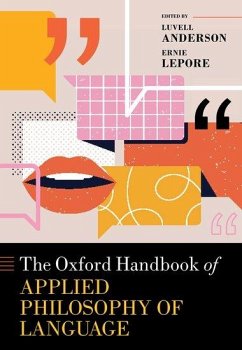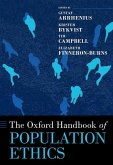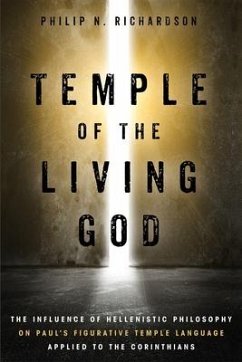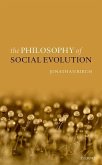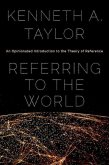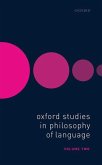The Oxford Handbook of Applied Philosophy of Language
Herausgeber: Anderson, Luvell; Lepore, Ernie
The Oxford Handbook of Applied Philosophy of Language
Herausgeber: Anderson, Luvell; Lepore, Ernie
- Gebundenes Buch
- Merkliste
- Auf die Merkliste
- Bewerten Bewerten
- Teilen
- Produkt teilen
- Produkterinnerung
- Produkterinnerung
This Handbook represents a collective exploration of the emerging field of applied philosophy of language, where philosophy engages with linguistic aspects of our social world. It explores such hot topics as dehumanizing speech, dogwhistles, taboo language, pornography, appropriation, implicit bias, speech acts, and the ethics of communication.
Andere Kunden interessierten sich auch für
![The Oxford Handbook of Population Ethics The Oxford Handbook of Population Ethics]() The Oxford Handbook of Population Ethics167,99 €
The Oxford Handbook of Population Ethics167,99 €![Temple of the Living God: The Influence of Hellenistic Philosophy on Paul's Figurative Temple Language Applied to the Corinthians Temple of the Living God: The Influence of Hellenistic Philosophy on Paul's Figurative Temple Language Applied to the Corinthians]() Philip N. RichardsonTemple of the Living God: The Influence of Hellenistic Philosophy on Paul's Figurative Temple Language Applied to the Corinthians65,99 €
Philip N. RichardsonTemple of the Living God: The Influence of Hellenistic Philosophy on Paul's Figurative Temple Language Applied to the Corinthians65,99 €![The Philosophy of Social Evolution The Philosophy of Social Evolution]() Jonathan BirchThe Philosophy of Social Evolution60,99 €
Jonathan BirchThe Philosophy of Social Evolution60,99 €![Referring to the World Referring to the World]() Kenneth A TaylorReferring to the World90,99 €
Kenneth A TaylorReferring to the World90,99 €![Oxford Studies in Philosophy of Language Volume 2 Oxford Studies in Philosophy of Language Volume 2]() Oxford Studies in Philosophy of Language Volume 2101,99 €
Oxford Studies in Philosophy of Language Volume 2101,99 €![The Duty to Vote The Duty to Vote]() Julia MaskivkerThe Duty to Vote57,99 €
Julia MaskivkerThe Duty to Vote57,99 €![The Politics of German Idealism The Politics of German Idealism]() Christopher YeomansThe Politics of German Idealism93,99 €
Christopher YeomansThe Politics of German Idealism93,99 €-
-
-
This Handbook represents a collective exploration of the emerging field of applied philosophy of language, where philosophy engages with linguistic aspects of our social world. It explores such hot topics as dehumanizing speech, dogwhistles, taboo language, pornography, appropriation, implicit bias, speech acts, and the ethics of communication.
Produktdetails
- Produktdetails
- Verlag: Oxford University Press, USA
- Seitenzahl: 720
- Erscheinungstermin: 13. Mai 2024
- Englisch
- Abmessung: 250mm x 180mm x 40mm
- Gewicht: 1g
- ISBN-13: 9780192844118
- ISBN-10: 0192844113
- Artikelnr.: 68506265
- Verlag: Oxford University Press, USA
- Seitenzahl: 720
- Erscheinungstermin: 13. Mai 2024
- Englisch
- Abmessung: 250mm x 180mm x 40mm
- Gewicht: 1g
- ISBN-13: 9780192844118
- ISBN-10: 0192844113
- Artikelnr.: 68506265
Luvell Anderson is Associate Professor of Philosophy and Affiliate Faculty in African American Studies and Women's and Gender Studies at Syracuse University. Before coming to Syracuse, he was an assistant professor of philosophy at the University of Memphis and Alain Locke Postdoctoral Fellow at Pennsylvania State University. His research lies principally in Philosophy of Language, Philosophy of Humor, and Philosophy of Race. He has published articles on the semantics of racial slurs and racist humor, and is co-editor of the Routledge Companion to the Philosophy of Race (Routledge Press). Professor Anderson is currently working on a book, The Ethics of Racial Humor, which explores themes of race, humor, and the connection between ethics and aesthetics. Ernie Lepore is Board of Governors Professor of Philosophy at Rutgers University. He has authored numerous books and papers in the philosophy of language, philosophical logic, metaphysics and philosophy of mind, including recently Imagination and Convention (with Matthew Stone, OUP, 2015), and Liberating Content (2016) with Herman Cappelen. He is the co-editor of The Oxford Handbook of Contemporary Philosophy of Language (with Una Stojnic, 2024) and of the series Oxford Studies in Philosophy of Language, with David Sosa.
* 1: Luvell Anderson and Ernie Lepore: Introduction
* 2: Sally Haslanger and Stephen Yablo: Amelioration as Course
Correction
* 3: Ángeles Eraña and Axel Barceló: A world where many worlds fit
* 4: J. L. Dowell: Silencing and Assertion: An Account of their
Conversational Dynamic
* 5: Quill R. Kukla: The Pragmatics of Technologically Mediated Online
Speech: Don't @ Me!
* 6: Robin Jeshion: The Truth About Slurs
* 7: Una Stojni¿ and Ernie Lepore: Slurring Words
* 8: Rebecca Roache: On Passive Aggression
* 9: Timothy Jay: Taboo Word Research: Problems from the Past, Plans
for the Future
* 10: Louise Antony: Speech-Act Theory in Feminist Thought
* 11: Mari Mikkola: Pornography as Oppressive Speech
* 12: Cameron Domenico Kirk-Giannini and Michael Glanzberg: Pronouns
and Gender
* 13: E. M. Hernandez and Archie Crowley: How to Do Things with
Gendered Words
* 14: Iz González Vázquez, Martina Rosola, and Anna Klieber: Beyond
Pronouns: Gender Visibility and Neutrality across Languages
* 15: Anita L. Allen: Privacy, Critical Definition and Racial Justice
* 16: Jules Holroyd and Matthew J. Cull: Gender-neutrality and family
leave policies
* 17: Esa Saarinen: In Praise of Spoken Philosophy
* 18: Teresa Blankmeyer Burke: Boxed Ears and Swiveling Fists: American
Sign Language, Audism, and Power
* 19: Luvell Anderson: Resistance and Reclamation: Notorious Thugs
* 20: José Medina: Public Protest and Silencing
* 21: Jeffrey King: The Contents of Maps
* 22: Gabriel Greenberg: Map Semantics and the Geography of Meaning
* 23: John Kulvicki: The Semantics of Iconography and Code Words
* 24: Ray Drainville and Jennifer Saul: Visual and Linguistic
Dogwhistles
* 25: erman Cappelen and Josh Dever: AI with Alien Content and Alien
Metasemantics H
* 26: Daian Flórez: Semantic Change in the Language of Technology
* 27: Eliot Michaelson, Jessica Pepp, and Rachel Sterken: On Retweeting
* 28: Matthew McKeever: Ideology and Intersectionality
* 29: Tina Chanter and Andrew Cutrofello: Shakespeare's Proper Names
* 30: Noël Carroll: Art and Language
* 2: Sally Haslanger and Stephen Yablo: Amelioration as Course
Correction
* 3: Ángeles Eraña and Axel Barceló: A world where many worlds fit
* 4: J. L. Dowell: Silencing and Assertion: An Account of their
Conversational Dynamic
* 5: Quill R. Kukla: The Pragmatics of Technologically Mediated Online
Speech: Don't @ Me!
* 6: Robin Jeshion: The Truth About Slurs
* 7: Una Stojni¿ and Ernie Lepore: Slurring Words
* 8: Rebecca Roache: On Passive Aggression
* 9: Timothy Jay: Taboo Word Research: Problems from the Past, Plans
for the Future
* 10: Louise Antony: Speech-Act Theory in Feminist Thought
* 11: Mari Mikkola: Pornography as Oppressive Speech
* 12: Cameron Domenico Kirk-Giannini and Michael Glanzberg: Pronouns
and Gender
* 13: E. M. Hernandez and Archie Crowley: How to Do Things with
Gendered Words
* 14: Iz González Vázquez, Martina Rosola, and Anna Klieber: Beyond
Pronouns: Gender Visibility and Neutrality across Languages
* 15: Anita L. Allen: Privacy, Critical Definition and Racial Justice
* 16: Jules Holroyd and Matthew J. Cull: Gender-neutrality and family
leave policies
* 17: Esa Saarinen: In Praise of Spoken Philosophy
* 18: Teresa Blankmeyer Burke: Boxed Ears and Swiveling Fists: American
Sign Language, Audism, and Power
* 19: Luvell Anderson: Resistance and Reclamation: Notorious Thugs
* 20: José Medina: Public Protest and Silencing
* 21: Jeffrey King: The Contents of Maps
* 22: Gabriel Greenberg: Map Semantics and the Geography of Meaning
* 23: John Kulvicki: The Semantics of Iconography and Code Words
* 24: Ray Drainville and Jennifer Saul: Visual and Linguistic
Dogwhistles
* 25: erman Cappelen and Josh Dever: AI with Alien Content and Alien
Metasemantics H
* 26: Daian Flórez: Semantic Change in the Language of Technology
* 27: Eliot Michaelson, Jessica Pepp, and Rachel Sterken: On Retweeting
* 28: Matthew McKeever: Ideology and Intersectionality
* 29: Tina Chanter and Andrew Cutrofello: Shakespeare's Proper Names
* 30: Noël Carroll: Art and Language
* 1: Luvell Anderson and Ernie Lepore: Introduction
* 2: Sally Haslanger and Stephen Yablo: Amelioration as Course
Correction
* 3: Ángeles Eraña and Axel Barceló: A world where many worlds fit
* 4: J. L. Dowell: Silencing and Assertion: An Account of their
Conversational Dynamic
* 5: Quill R. Kukla: The Pragmatics of Technologically Mediated Online
Speech: Don't @ Me!
* 6: Robin Jeshion: The Truth About Slurs
* 7: Una Stojni¿ and Ernie Lepore: Slurring Words
* 8: Rebecca Roache: On Passive Aggression
* 9: Timothy Jay: Taboo Word Research: Problems from the Past, Plans
for the Future
* 10: Louise Antony: Speech-Act Theory in Feminist Thought
* 11: Mari Mikkola: Pornography as Oppressive Speech
* 12: Cameron Domenico Kirk-Giannini and Michael Glanzberg: Pronouns
and Gender
* 13: E. M. Hernandez and Archie Crowley: How to Do Things with
Gendered Words
* 14: Iz González Vázquez, Martina Rosola, and Anna Klieber: Beyond
Pronouns: Gender Visibility and Neutrality across Languages
* 15: Anita L. Allen: Privacy, Critical Definition and Racial Justice
* 16: Jules Holroyd and Matthew J. Cull: Gender-neutrality and family
leave policies
* 17: Esa Saarinen: In Praise of Spoken Philosophy
* 18: Teresa Blankmeyer Burke: Boxed Ears and Swiveling Fists: American
Sign Language, Audism, and Power
* 19: Luvell Anderson: Resistance and Reclamation: Notorious Thugs
* 20: José Medina: Public Protest and Silencing
* 21: Jeffrey King: The Contents of Maps
* 22: Gabriel Greenberg: Map Semantics and the Geography of Meaning
* 23: John Kulvicki: The Semantics of Iconography and Code Words
* 24: Ray Drainville and Jennifer Saul: Visual and Linguistic
Dogwhistles
* 25: erman Cappelen and Josh Dever: AI with Alien Content and Alien
Metasemantics H
* 26: Daian Flórez: Semantic Change in the Language of Technology
* 27: Eliot Michaelson, Jessica Pepp, and Rachel Sterken: On Retweeting
* 28: Matthew McKeever: Ideology and Intersectionality
* 29: Tina Chanter and Andrew Cutrofello: Shakespeare's Proper Names
* 30: Noël Carroll: Art and Language
* 2: Sally Haslanger and Stephen Yablo: Amelioration as Course
Correction
* 3: Ángeles Eraña and Axel Barceló: A world where many worlds fit
* 4: J. L. Dowell: Silencing and Assertion: An Account of their
Conversational Dynamic
* 5: Quill R. Kukla: The Pragmatics of Technologically Mediated Online
Speech: Don't @ Me!
* 6: Robin Jeshion: The Truth About Slurs
* 7: Una Stojni¿ and Ernie Lepore: Slurring Words
* 8: Rebecca Roache: On Passive Aggression
* 9: Timothy Jay: Taboo Word Research: Problems from the Past, Plans
for the Future
* 10: Louise Antony: Speech-Act Theory in Feminist Thought
* 11: Mari Mikkola: Pornography as Oppressive Speech
* 12: Cameron Domenico Kirk-Giannini and Michael Glanzberg: Pronouns
and Gender
* 13: E. M. Hernandez and Archie Crowley: How to Do Things with
Gendered Words
* 14: Iz González Vázquez, Martina Rosola, and Anna Klieber: Beyond
Pronouns: Gender Visibility and Neutrality across Languages
* 15: Anita L. Allen: Privacy, Critical Definition and Racial Justice
* 16: Jules Holroyd and Matthew J. Cull: Gender-neutrality and family
leave policies
* 17: Esa Saarinen: In Praise of Spoken Philosophy
* 18: Teresa Blankmeyer Burke: Boxed Ears and Swiveling Fists: American
Sign Language, Audism, and Power
* 19: Luvell Anderson: Resistance and Reclamation: Notorious Thugs
* 20: José Medina: Public Protest and Silencing
* 21: Jeffrey King: The Contents of Maps
* 22: Gabriel Greenberg: Map Semantics and the Geography of Meaning
* 23: John Kulvicki: The Semantics of Iconography and Code Words
* 24: Ray Drainville and Jennifer Saul: Visual and Linguistic
Dogwhistles
* 25: erman Cappelen and Josh Dever: AI with Alien Content and Alien
Metasemantics H
* 26: Daian Flórez: Semantic Change in the Language of Technology
* 27: Eliot Michaelson, Jessica Pepp, and Rachel Sterken: On Retweeting
* 28: Matthew McKeever: Ideology and Intersectionality
* 29: Tina Chanter and Andrew Cutrofello: Shakespeare's Proper Names
* 30: Noël Carroll: Art and Language

